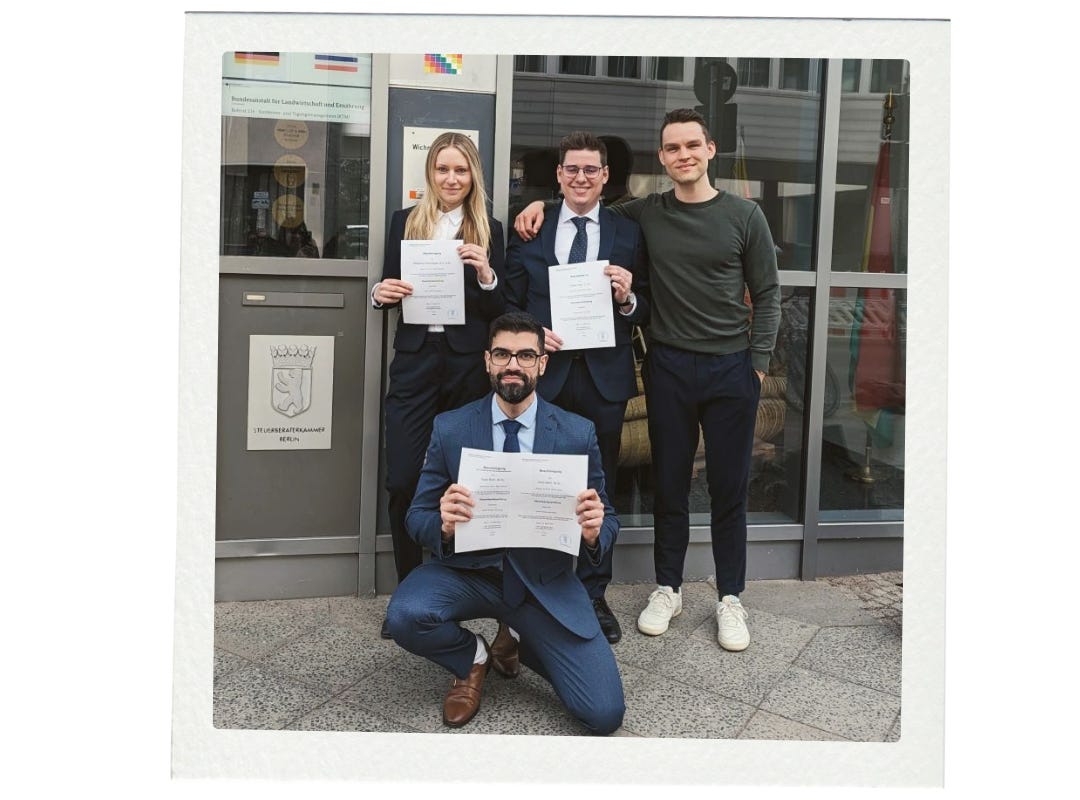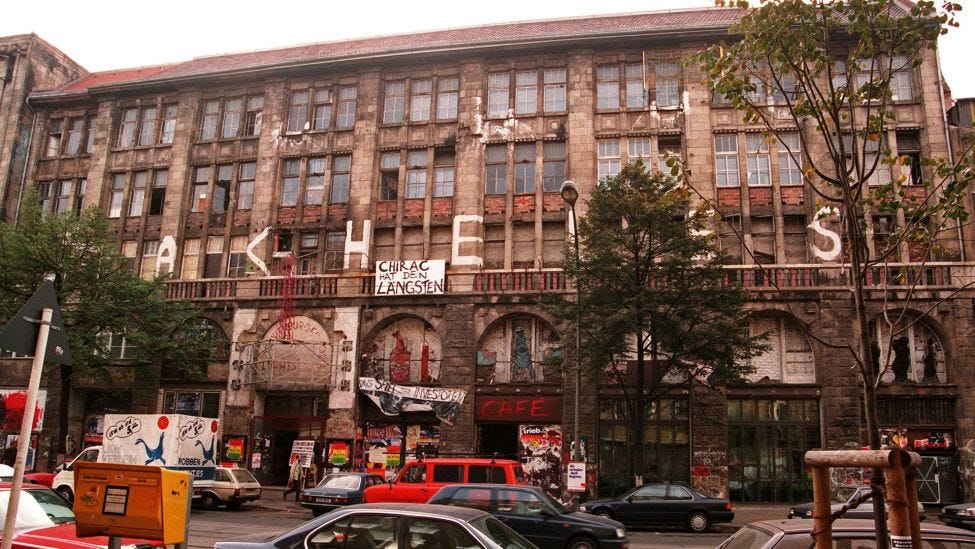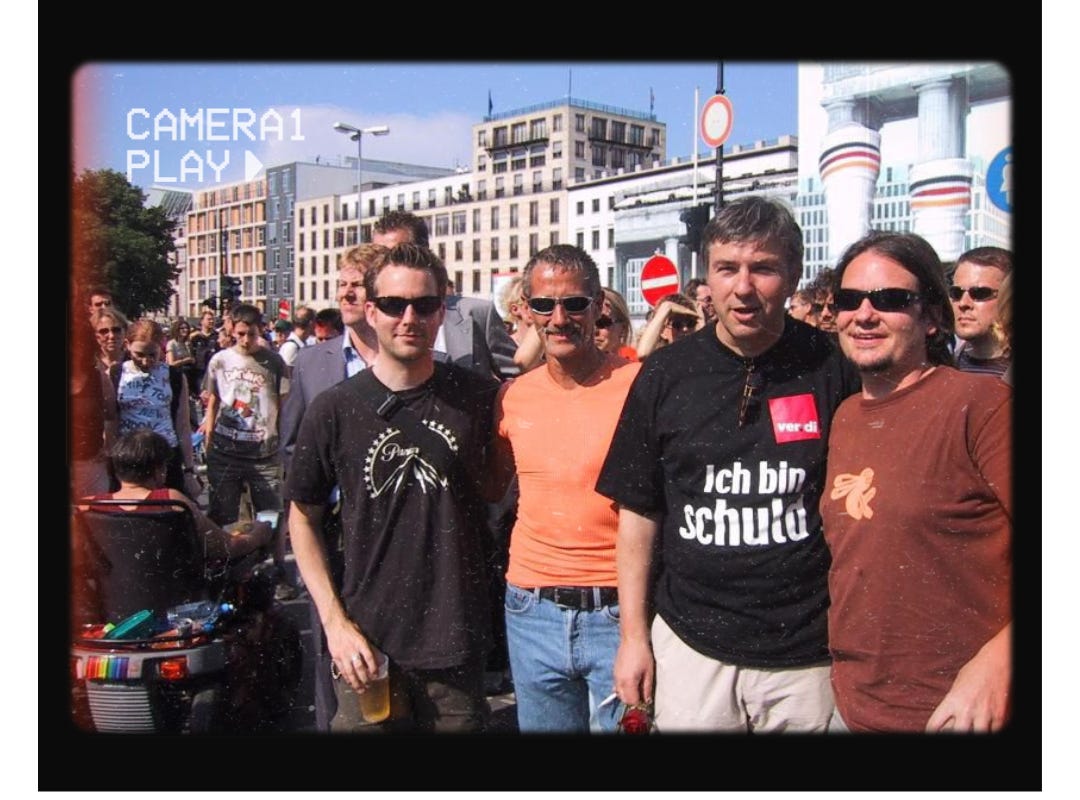🥨 Späti Stories #2: Meet Katharina and Andrew – Chaos, Opportunity, and Belonging in Berlin
Katharina moved to Berlin to work for the Deutscher Bundestag, while Andrew, a journalist, co-founded 20 Percent Berlin after working in a newsroom.
🎧 Listening to Ich will nicht nach Berlin -Kraftklub
In our last issue, we featured stories of Berliners born into and drawn to the city's unique spirit. Now, we focus on those who arrived well after the fall of the Wall—whether as Berlin was transforming into the city it is today or once it had already become the Berlin we now know.
For people like Katharina Mayer, from a small village in southern Germany, and Andrew Bulkeley from a small town in the U.S., Berlin offered both chaos and opportunity. Katharina moved here to work in the heart of German politics, while Andrew, a journalist, co-founded 20 Percent Berlin after working in a newsroom.
In Berlin, stories like theirs are just a drink or coffee away—now, they're also just a newsletter away. Grab your drink and enjoy their stories.
Katharina Mayer, originally from Engelbrechtsmünster, a village in Bavaria, moved to Berlin in 2022 to pursue her passion for taxes and politics at the Deutsche Bundestag. Now also a Steuerberater, she enjoys connecting with Berlin's diverse community.
Katharina asked us to meet her at the Bundestag. Along with our passports, we brought our best German. To our surprise, the security greeted us in English with a smile—first stereotype broken.
Katharina gave us a brief tour of her section of the Parliament building. Apart from being where major decisions happen (or don’t), it felt like a typical workspace—except for the stunning architecture of the Paul-Löbe-Haus building, which left us in awe.

We found a quiet spot to sit, set up the camera, and settled in despite the humid weather, which we could feel due to the building’s open layout that connected to the outdoors. Our first question: “How did you end up here—in Berlin, and specifically in the Bundestag?”
Katharina grew up in Engelbrechtsmünster, a small village near Ingolstadt. After a semester abroad in Norway broadened her horizons, she realized her old routine wouldn’t be enough.
When she spotted a LinkedIn posting for a Wissenschaftlicher Mitarbeiter at the Bundestag, she applied despite her doubts. A week later, she was packing for Berlin, ready to combine her love for politics and tax law.
Intrigued by her career in taxes, we asked how someone develops such a passion.
She explained that she began working as a Steuerfachangestellte at 16, right after Realschule. The job suited her structured way of thinking, and over time, she grew passionate about the societal importance of fair taxation. Her motivation was also deeply personal—her mother, who had worked in the same field, became too ill to continue. Determined to fulfill what her mother couldn’t, Katharina decided to go even further in her honor by becoming a Steuerberater.

“My family was very traditional and not career-focused. I always had the ambition to make the most of my potential. In school, I often felt like I wasn’t good enough, but my brother believed in me. He pushed me to do more, convincing me I could succeed if I studied. He introduced me to the German political system when I was 10, and I was always inspired by those stories,” she reflected.
Now officially a Steuerberater, Katharina is driven by a desire to make a difference. We asked her what fuels her motivation in this profession.
“At the Bundestag, my main motivation is to help create a fairer and more efficient tax system. Right now, we have a lot of issues—too much bureaucracy. Many people aren’t even interested in taxes, unlike other areas like healthcare or foreign policy. People have emotional connections to those topics, but taxes? They don’t understand how the system works, so they don’t want to engage with it. I want people to understand the system and how it can be improved. We need to find a balance without overburdening people so they don’t lose the motivation to work and succeed.
I’m very passionate about improving the tax system, and in politics, it’s like that—you put in a lot of effort, and 95% of it might not lead to change, but the 5% that does? That’s what keeps me going.”
Finally, we asked her what the difference was between the village Katharina and the Berlin Katharina.
She smiled and reflected, “I think people would first notice that I speak Hochdeutsch now instead of Bavarian. But the real difference is that I’m much more self-reflective, more open, and more extroverted. I don’t judge people by how they look or what they say. I prefer to talk with people, not over them. And when you’re open, people open up to you. Living in Berlin, especially with all the political events and diversity here, has taught me to adapt and appreciate the good, while also being aware of the negatives. In the Bundestag, everything is clean, and everyone wears suits, but even here, there are challenges. There’s always a downside to everything, but it’s worth focusing on the beautiful sides.”
Andrew Bulkeley, originally from a small town in Colorado, is a journalist, comedian, and the founder of the 20 Percent Berlin newsletter. He moved to Berlin more than 20 years ago, in the early 2000s.
We told Andrew that we usually conduct interviews in places that hold personal significance for the interviewee—whether it’s a café, park, home, or former university. Without hesitation, he said, “Then let’s do Keyser Soze.”
We hadn’t heard of it before, but when we arrived, we realized we pass this spot almost daily due to our office’s location. From the outside, it looked like just another “Mitte restaurant.”
After checking with the waitress about filming, she assured us in German: “As long as it’s not political or racist, you can do anything here.”
When Andrew arrived, we recognized him immediately (we’ve been fans of 20 Percent Berlin for a while 💗) and couldn’t resist fangirling a bit. He handled it well.

Naturally, we were curious why he chose this place. Andrew explained that Keyser Soze was one of the first “good restaurants” in the area when he moved to Berlin in 2000, back when the neighborhood was “more chaotic”. The restaurant is near Tacheles, a former abandoned building turned artistic hub after the fall of the Wall. Now home to Fotografiska Berlin, traces of its past still linger.
Captivated by the creativity and chaos around Tacheles, Andrew and his friends often gathered at Keyser Soze. “How did you end up in Berlin in the first place?”, we asked.
Andrew explained that his move to Berlin was not planned. He initially went to Germany to gain international journalism experience, settling in Frankfurt am Main. At the time, most of his colleagues avoided Berlin, but after visiting once, he was hooked. He began volunteering for assignments there, with his trips covered by work, often extending his stays to explore the city. Though an offer to relocate fell through, Andrew soon found another job in Berlin and made the move permanent, realizing it was one of the best decisions of his life.
We found it amusing that Andrew moved to Berlin “by accident.” So, we wanted to know why he chose to stay.
“Honestly, it was because of the Tacheles area,” he said. “It felt like the center of the creative universe at the time. All these people didn’t care about money or careers—they just wanted to live their lives the way they wanted. I had my job and career aspirations, but that wasn’t really me. Berlin felt like a place where I could have my job but still be whoever I wanted to be.”

We laughed, finally understanding why Keyser Soze held such meaning for Andrew—it even began to mean something to us. When asked if Berlin’s changes bothered him, Andrew was clear: while the city has changed, people complain too much. After 24 years, it would be disappointing if it hadn’t. "Cities that don’t evolve become boring," he said. Despite rising living costs and housing issues, he’s not sad about Berlin’s transformation—it was necessary.
Curious about what initially drew him to Germany, we asked Andrew how it all began. He explained that in 7th grade, students had to pick a foreign language. While most chose Spanish, he deliberately picked German to stand out. However, he quickly regretted the decision, as German proved much harder to learn. Despite that, he stuck with it for four years and decided to put his effort to use. He became an exchange student in a small town near Cologne, which is where he truly learned the language.
Andrew is fluent in German, even performing comedy in the language. We were wondering how he became so proficient, especially when many expats struggle with it.
“English in Berlin is a more recent phenomenon—since around 2015. Back when I came, you had to speak German. You could get by with English among expats, but you couldn’t walk into a café and order in English like you can today. They’d have kicked you out. But in the creative scene, English was fine. I was younger when I learned, so my brain was still adaptable. Also, you have to really want to learn a language and make it part of your identity.
I came from an unstable home, so when I moved to Germany, I reinvented myself, and part of that was making German part of who I am.”
His ease with words made it clear why he’s both a journalist and comedian. We could have spent hours talking, but we were eager to learn more about the creation of 20 Percent Berlin.
In 2015, long before his now-popular newsletter, Andrew noticed a gap in knowledge among English-speaking comedians in Berlin. Many didn’t know basic facts, like who the chancellor was, due to the language barrier. With his journalism background, Andrew saw an opportunity to bridge that gap.
After he and his colleague Maurice were laid off from Berliner Zeitung, where they’d run a successful newsletter, Maurice suggested they continue independently. Andrew, knowing he was good at starting projects but struggled with follow-through, agreed. Maurice, who had founded Ex-Berliner (now The Berliner, after its acquisition by a media group), provided the steady hand needed to make them a strong team.
He explained that the pandemic played a crucial role in the founding of 20 Percent Berlin. With people stuck at home, especially those who didn’t speak German, there was a growing hunger for information. “We carried over the pandemic ticker from Berliner Zeitung, providing case updates, and our concise summaries kept readers engaged.”
Finally, we invited him to reflect on the difference between Andrew in Colorado and Andrew in Berlin.
“Andrew in Colorado was pretty boring,” he admitted. “I always knew it was too small for me, but I didn’t know how to get out. My family didn’t really give guidance on that. When I came to Berlin, it was the first truly international city I’d lived in, and it just clicked. It could’ve been any big city, but for me, it was Berlin. Now, I’m much more active—there’s always something to do. I go to fewer art galleries or concerts now because of comedy, but I’m definitely more active here than I ever was in Denver. I was searching for something there that just wasn’t available, but you can find it here.”

Katharina and Andrew moved to Berlin for different reasons, but both chose to stay—Katharina to drive change in the German capital, and Andrew to document and live through its transformation.
We hope these stories inspire you to step out and connect with a stranger—you might have more in common than you think.
Cheers from Berlin 🍂,
Isabelle and Lua









Nice to discover Spati Stories :) Interesting articles and a cool title. Was lovely to read about 20% Berlin founder - their newsletter saved my expat ass in quite a few conversations. Keep on creating!
bumped randomly into your content in instagram and was immediately caught by the newsletter idea. very sensitive and interesting! thanks